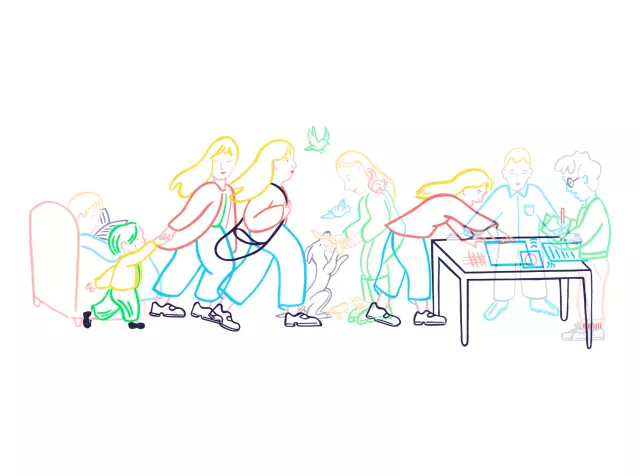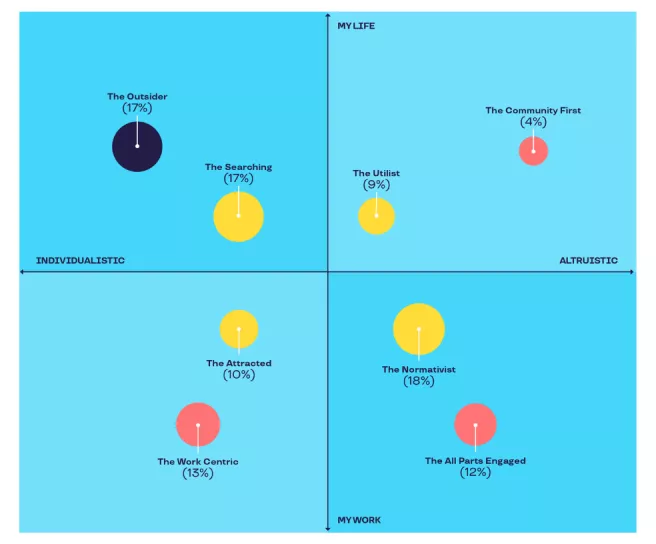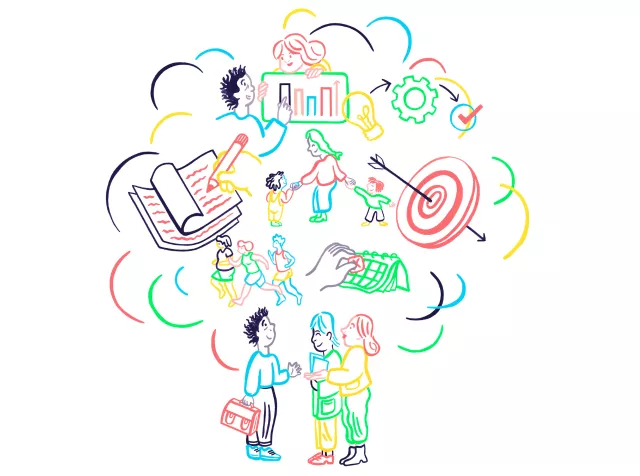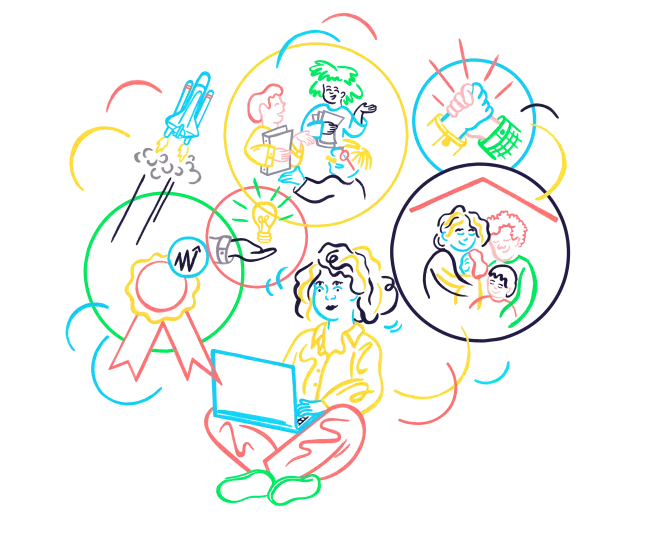Our global study spans 10 countries and includes insights from 8,700 employees, giving us a unique perspective into how people engage at work. The findings reveal a workforce that is committed but on their own terms. Work is no longer separate from life; it's part of a broader equation made up of career, friends & family, and community. Discover the new rules of engagement and how they will shape the future of work.
The New Rules of Engagement was developed with support from Ipsos and enriched by the perspectives of world of work experts Brigid Schulte and Jean-Baptiste Barféty. Through data, expert insights, and real-world stories, it highlights how employees are finding balance between their careers, personal lives, and community involvement.
Discover the full findings and learn how to turn this shift into an opportunity for lasting engagement.
Measured Engagement: work is part of a broader equation
Employees view their work as a meaningful part of their lives, alongside personal and community commitments. However, they don’t want to feel pressured to choose between work and their personal lives. A noticeable share of employees in India (40%) say work is essential but not the sole focus of their life.
Engagement at work isn’t something we unquestioningly adopt and it’s not simply about being all in or all out. Instead, it’s a living, breathing spectrum that people navigate, from doing the bare minimum to achieving peak performance. Measured engagement is a consistent phenomenon observed across employee generations, accounting for 32-35% of the workforce globally, depending on age group. These employees choose to engage with their work intentionally, without compromising their boundaries, personal values, or the balance they seek to strike between work, personal life, and community commitments.
40%
of employees in India say that work is essential but not the sole focus of their lives
95%
of employees in India used words like ‘love’ or ‘like’ to describe how they feel about their organisation
15%
of employees in India identify with Measured Engagement
The unexpected bond
The bond between employees, their jobs, and companies is significant. In fact, more than half of workers want to remain in their current positions.
The work-life equation
Employees do value their work. However, they don’t want to feel pressured to choose between their jobs and their personal lives.
A living, breathing spectrum of engagement
Engagement isn’t something we unquestioningly adopt because the company says we should. It’s a living, breathing spectrum that people navigate.
Shades of engagement: a matter of time and life stages
Our study highlights two main factors influencing engagement: the importance placed on life versus work, and whether our focus is more personal or collective. These factors combine to create eight distinct profiles, each reflecting a different shade of engagement we might experience throughout our careers.
These profiles range from those who take a more balanced approach to engagement, like The Searching, who looks for a greater sense of purpose outside of the company, to highly engaged profiles like The Work Centric, who prioritizes work over their personal life. In the words of our expert Jean-Baptiste Barféty, these eight shades of engagement paint a picture of an employee who fluctuates depending on their stage of life and priorities: they dedicate time to their work while setting boundaries, they commit to social causes when they can, and conversely, they recharge their batteries when they feel the need.
The 8 shades of employee engagement
Engagement is as individual as we are. Our study highlights two main factors influencing employee engagement: the importance placed on life versus work, and whether our focus is more personal or collective. These factors combine to create eight distinct profiles, each reflecting a different shade of engagement we might experience throughout our careers.
The shades of engagement
Employee engagement fluctuates depending on stage of life and priorities.
A sense of agency
Employees feel more in control when they have the time and space to find their own ways to engage.
The secret to the good life
People want the freedom to use their time however they choose to live a better life.
Reciprocity: the key to unlocking people’s engagement potential
Employees know exactly what they're looking for in return for their contributions. They need recognition and to be rewarded for the time and energy they invest in their roles. They are particularly drawn to companies that focus on material benefits, growth and autonomy, and fostering human connections. These three key employee expectations lay a strong foundation for companies looking to build a mutually beneficial relationship with their employees. For engagement to truly benefit both parties, organizations need to take it to the next level by gaining a deeper, more up-close and personal view of who their employees are.
When asked about the main factors that make a company attractive, over one-third of employees mentioned benefits that genuinely satisfy their needs. Meeting this rising demand for personalized benefits is the way companies can unleash employees' full potential.
35%
of employees in India say that being recognized for their commitment is the thing that makes them feel most fulfilled at work
40%
of employees in India say a caring atmosphere at work is the thing that makes them feel the most fulfilled at work
42%
of employees in India rank "good salaries" as the top driver of company attractiveness
Engagement is a two-way street
Employees are particularly drawn to companies that focus on three key areas: growth and autonomy, fostering human connections, and material benefits.
The #1 driver of fulfillment at work
Employees said that a nice and caring work environment is essential to feeling fulfillment at work.
Encouraging growth and autonomy
Helping employees develop a future-proof skillset helps them feel optimistic and strengthens their sense of agency.
“Technology is frequently viewed as conflicting with human connection or care. However, I believe that in the future, tech will become a valuable ally for companies aiming to show their dedication to employees, extending beyond work. It will facilitate creating personalized HR policies and benefits customized to each person's unique needs.”
Fabiana Galetol, People & Sustainability Director for Brazil at Pluxee
From one-size-fits-all to personalized experiences that truly fit
Engagement grows when companies create the right conditions for it to flourish. Forward-thinking employers move beyond generic solutions to offer personalized experiences and benefits that truly fit people’s lives. By recognizing that each employee has a different life journey, they enable their workforce to define their own purpose while staying connected to the company’s mission. This tailored approach turns engagement into a shared source of growth, meaning, and performance.
At a time when our understanding of employee engagement is shifting , we decided to bring together two leading experts. Their insight illuminates both the structural forces reshaping work and the lived experiences of employees, while also offering practical solutions for companies wanting to future-proof their workforce’s engagement.
Jean-Baptiste Barféty
Public policy expert specializing in work, organisational transformation, and the common good
Jean-Baptiste Barféty offers an institutional perspective on the evolving nature of work. As co-leader of a research group at Collège des Bernardins focused on work, a former advisor to the French Ministry of Labor, and rapporteur of the influential Notat-Senard report that shaped French legislation on purpose-driven companies, he connects academic insights with corporate realities. His recent studies for Projet Sens — a collective of HR Directors promoting dialogue among researchers, executives, and managers — include “Giving Sense to Work” and “Remote Work, Real Managers: 5 years After Lockdown.” He highlights the structural and policy factors affecting today’s pursuit of meaningful work.
Brigid Schulte
Director of the Better Life Lab and The Good Life Initiative at New America, New York Times bestselling author
Brigid Schulte explores how personal transformation and systemic change can create fuller, more meaningful lives. A Pulitzer Prize–winning journalist and director of the Better Life Lab at New America, she uses storytelling to rethink work, care, gender, and time. Author of "Over Work" and the New York Times bestseller "Overwhelmed", she examines the pressures of modern life and the quest for balance. Through her writing, speaking, and the Better Life Lab podcast, she inspires a cultural shift toward more humane and equitable ways of living and working.
Every voice tells a story. Beyond the data, this study highlights the real people behind the numbers. Get a firsthand account of how employees navigate purpose, balance, and connection in the workplace.
“Previously it was a challenge to balance my work and personal life. Now I follow a timetable so I can involve myself in personal life also. I take breaks, go on vacation with my family and give time to the NGO as well.”
Lokesh, Gurugram
“Everything should be in balance: your work, your me time, your family time and your colleagues. It should be balanced emotionally and with practicality so you can achieve the goals you have written on paper.”
Ronak, Mumbai
“I try to balance my personal and work life by using the hybrid model. I work from home and come to the office when needed, which helps me manage my responsibilities at work as well as with my child.”
Suhana, India
“Being engaged at work is having enough work in hand and not sitting idle. When you take a job, complete it and get appreciation from your employer, it gives you a sense of accomplishment and allows you to try new things.”
Bhavana, Bengaluru
“Achievement at work comes from taking decisions by yourself, not creating issues and working as a team. If there is any advice or implementation needed, you follow it and maintain a good work culture so everyone can improve.”
Lokesh, Gurugram
“Engagement is doing something you like so you do not get bored or wait for the next break. I make short plans, like completing a percentage of work by the first half of the day. Accomplishment is setting a target for the next few weeks or a month and achieving it, and then the organisation rewards you for it.”
Rohan, New Delhi
“It is always good to be engaged, but you need not stress about it. It is okay to sit idle and be free. Spending time with yourself is also a kind of engagement."
Bhavana , Bengaluru
“If I had four extra hours per day, I would spend them with my family, develop some new habits and play a sport. I want to discover the hidden talents that I have when I am not working.”
Rohan, New Delhi
“Employers should make some good networking and team joining activities so employees can explore and feel good. They should listen to what employees want in their goals and how they want to align with the company’s vision.”
Ronak, Mumbai
















